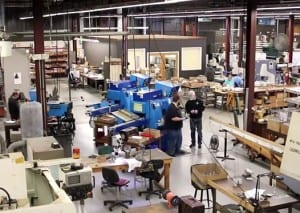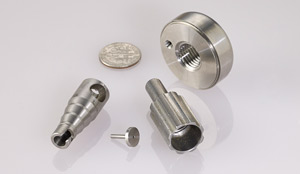
What is Swiss machining? Swiss machining is a manufacturing technique that offers specialized tool cutting designed to turn metal stock into complex, slender, or delicate components that require tight tolerances. Swiss machining generally refers to the Swiss-designed CNC-operated lathe that turns parts in a radial motion as it cuts the workpiece. The process is not only cost-effective, but it presents increased precision over other similar methods.
Where Is Swiss Machining Used?
Swiss machining can produce small, intricate parts in high volume for a number of industries, predominantly automotive, medical, defense, and electronics-related sectors. Parts produced by this type of machining are found in medical devices, optical equipment, firing pins, shafts, timepieces, connecting components for electronic devices and aerospace parts, and much more.
 CNC Swiss-style machining can machine longer, slender, and more complex parts with incredible accuracy, efficiency, and throughput. The technology is used widely in the medical industry where highly exacted standards are necessary for components such as surgical screws and tools. But other industries besides the surgical tools and devices used in the medical field benefit from parts and components produced by Swiss machining – aerospace, computers and IT, electronics, energy and fuel systems, precision timing, and defense systems all rely on the advantages that this technique offers. Implants, shafts, contact pins, housings, inserts, and sockets are all commonly created via this type of machining.
CNC Swiss-style machining can machine longer, slender, and more complex parts with incredible accuracy, efficiency, and throughput. The technology is used widely in the medical industry where highly exacted standards are necessary for components such as surgical screws and tools. But other industries besides the surgical tools and devices used in the medical field benefit from parts and components produced by Swiss machining – aerospace, computers and IT, electronics, energy and fuel systems, precision timing, and defense systems all rely on the advantages that this technique offers. Implants, shafts, contact pins, housings, inserts, and sockets are all commonly created via this type of machining.
Swiss Lathe Capabilities
From small runs of a few hundred pieces up to hundreds of thousands, Swiss CNC machining allows designers to manufacture complex components on one machine. High-volume production runs with this machining can cover numerous processes, including, milling, threading, drilling, boring, turning, and other custom requirements. One machine can perform several operations at once in a shorter period of time while offering designers more control in the production of complex parts.
Swiss CNC machining is capable of producing intricate stainless steel parts with diameters ranging from 0.030 inches to 2 inches. This allows designers to meet the unique specifications of even the most demanding applications. Other metals such as Inconel, titanium, nickel, and nickel-based alloys can also be used to produce components that require close tolerances within 0.0001 inches concentricity to ±0.0005. Swiss machining can micro-machine tiny components with accuracy that are stronger, smaller, and lighter – faster. This all adds up to Swiss machines performing more complex machining operations than any other type of CNC machining system.
Where Does Swiss Turning Come From?
Swiss machine designs have been around for well over a century. Pushed by the demand placed on Swiss watchmakers for smaller and smaller components necessitated by the growing market for their pocket watches and wristwatches, the technology developed to machine tiny diameters accurately without flexing and ruining the part being turned. Credit the Swiss watchmaker Jakob Schweizer as the inventor of the Swiss machine in the mid-19th century. He conceived the novel approach of sliding parts along the longitudinal axis of a lathe rather than moving them down the tool post. The solution allowed for very small parts to be machined while being supported throughout the entire process.
Though the same principles developed by Swiss watchmakers still apply, today’s Swiss machines benefit from advancements in CNC programming technology that can accomplish refined, three-dimensional cutting tasks with a single push of a button. Components and parts can be cut near their bushings, which is why they are so well-suited to build longer pieces no matter the length. Designers and end users can execute complex geometries by simply feeding the raw stock into the machine to produce a finished part in one operation.
Eagle Stainless proudly utilizes Swiss CNC machining to produce stainless steel tubing with second-to-none efficiency, precision, and accuracy. Swiss CNC machining gives us a broad range of capabilities that meet the needs of many industries, from standard production runs to custom projects.




